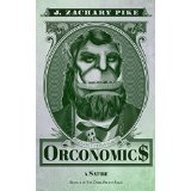Merry Magical Medieval Mercantilism: My Review of "Orconomics" by J. Zachary Pike

Orconomics: A Satire (The Dark Profit Saga Book 1) by J. Zachary Pike
File Size: 1136 KB
Print Length: 385 pages
Simultaneous Device Usage: Unlimited
Publisher: Gnomish Press LLC (September 30, 2014)
Sold by: Amazon Digital Services, Inc.
Language: English
ASIN: B00O2NDJ2M
Economics typically gets short shrift in Sci-Fi and fantasy. It doesn't really matter the genre. The fact is that when spaceships go out a' faring, or knights out a' questing, no one ever brings anyone with a degree in accounting to keep track of expenditures. The exceptions are few and far between (to enjoy one of the best in manga, I recommend Spice and Wolf ). I first wrote about the problem years ago in In Search of Stupidity: Over 20 Years of High-Tech Marketing Disasters:
...as Captain Kirk, Mr. Spock, Bones, Scottie, and their innumerable successors went gallivanting through the galaxy, they seemed to have no visible means of financial support. No one in the Star
Trek universe wearing green eye shades ever appeared to worry about the propensity of the various casts to blow up what you’d think were undoubtedly very expensive spaceships, given their capabilities of violating the laws of physics, transporting the crew to numerous planets inhabited by women who spent most of their time wearing lingerie, and dodging ray-gun fire from angry races of aliens who kept screaming “kaplok!” (and who also seemed to have no monetary worries).
The problem looms just as large in fantasy. Take, for instance the Lord of the Rings . Now, I know you've probably read the official version of what took place in Middle Earth at the end of the Third Age, but I have recently, at great effort and peril on my part, obtained a partial copy of The Silmarillon: The Rejected Chapters . It's only a partial manuscript, and the relevant sections are written in the dread tongue of Mordor. Translating it has been a bear what with all the declensions and the fact that these people just had no concept of the apostrophe, but I have done my best. The narrative below describes a key meeting between Sauron and an individual who served as Mordor's primary bean counter. Roughly translated, his court title is CME or Chief Mithril Extractor. I believe the text provides crucial insights into the real story behind TLOR and the fall of Sauron.
CME: Oh Cataclysmic Cat's Eye of Catastrophe, Dread Lord Sauron, I come to you with doom-laden news!
Sauron: What is it? Has Golem stuffed up his toilet again?
CME: No, Dread Lord Sauron, Oh Perilous Practitioner of Puissant Pestilence. Though that last episode was truly horrendous. The plumbing Orcs sent to rectify the situation have not yet recovered. No, Oh Master of Merciless Mayhem, the tidings are far more fell. The invasion of Gondor must be postponed!
Sauron: Postponed? Don't be ridiculous. I've been planning this invasion for years. The Orcs are armed and thirsting to plunder and kill any elf they can catch. The Ringwraiths are writhing in anticipation of drinking Gondorean blood. The Balrogs are bored from too much sitting around and are starting to whip each other. It's getting kinky in their section of the Dark Tower. They need to deploy right now and work the ya yas out. We march tonight!
CME: Alas Lord Sauron, Oh Sublime Sultan of Supreme Sadism, we cannot.
Sauron: Why not? And this had better be good.
CME: Because Oh Great Gargoyle of Gruesomeness, I have just come from an inspection of thy Dread Armies and have uncovered great woes. The Orc's armor is fourth rate and our production of MEMREs (I have translated this as "Middle Earth Meals Ready to Eat." Ed. note.) lags greatly behind quota. In their current shape, I rank the fighting prowess of the Uruk Hai just below that of Disney fairies. The entire horde couldn't stand up to a squadron of Hobbits armed with butter knives.
But this is just the start of the grim news. The Black Steeds of the Ringwraiths have disappeared and our chief cavalry arm is crippled. While no one has confessed, a domestic Orc emptying a chamber pot reported hearing strange whinnying sounds coming from the Balrog quarters the other night. I myself heard the Witch King threaten to "Uv thangor shakburz nash burzum" (I have translated this as "unload a can of whup ass." Ed. note.) unless those ponies are returned immediately. Despair and disorder fill the ranks, Oh Enduring Emblem of Eternal Evil.
Sauron: Egv gor fukardum upzorum!? (I have translated this as "What is the cause of this SNAFU?" Ed. note.)
CME: Lord Sauron, Oh Tremendous Thane of Truly Titanic Terror, we have suffered a supply chain breakdown.
Sauron: Huh?
CME: A supply chain breakdown. You see, the peasants plant and harvest the food, which they in turn provide to the Orcs, who in turn do most of the mining and weapons production around here. If not enough food is produced, the Orcs' manufacturing production drops off and quality goes to hell, so to speak. Also, remember that an army marches on its stomach. The peasants are also responsible for providing fresh meat to the Balrogs, who aren't big on veggies. Oh, and the peasants also provide the hay that the Ringwraiths' horses eat, thought that doesn't seem to be a problem at the exact moment.
Sauron: This issue is easily solved. Torture the peasants to produce more food!
CME: Ummmm, well, you see Oh Demonic Deity of Destruction, we can't do that. We have no more peasants.
Sauron: What happened to the peasants?
CME: The Orcs at them.
Sauron: Nagth lat ronk shitztorum!" (I have translated this as "Uh oh." Ed. note.)
At this point, the writing on manuscript becomes disordered and the readability of the parchment drops because of a series of blotches that have a suspicious resemblance to blood stains.
But, not to worry. Into this gaping literary void fearlessly tramps Orconomics, Part I of the Dark Profit Series by J. Zachary Pike.
Orconomics is set in your typical Tolkienesque/World of Warcraft milieu, but in Pike's universe economics lies at the core of everything that takes place in the book (just like the real world). The hero of Orconomics is Gorm Ingerson, a dwarf whom we first meet when he (reluctantly) saves the skin of Gleebek the Goblin, who repays our hero by attaching himself to Gorm's service despite the dwarf's deep desire to enjoy no such relationship.
Gorm and Gleebek's meeting is sparked by the activities of the Heroes Guild, an organization tasked with training, ranking, and regulating the various adventurers who comprise the organization's membership. The world of Orconomics is built on mercantilism, a zero-sum economic theory that was all the rage in Europe from the 16th through the 18th century. Modern forms are still practiced in Russia, China and similar places. Orconomics' mercantile model is built on raiding hoards of gold and treasure and redistributing them to the benefit of the raiders. Unfortunately for the heroes and the governments and institutions that rely on their labors, the number of hoards is running out.
Over the long term, mercantilism is a corrosive force that erodes an economy instead of building it (ask the Spanish Empire how this works). The same dynamic is at work in Gorm's world, and schemes and plots are afoot to try to reverse the tide of growing economic dissolution. Gorm, Gleebek, and a series of reluctant companions that include elves, wizards, thieves, bards (the usual mix) are soon caught up in a mysterious quest whose true goals are hidden and outcome unexpected.
Orconomics is at its best and funniest when it focuses on the sales and marketing issues underlying its economic woes. For instance, the following passage describes an unfortunate misunderstanding brought on by an Orcish community's unfortunate mishandling of a marketing opportunity and over reliance on the hard close during the sales cycle:
“But tell me, Tib’rin, how have I offended the honor of these mercenary-dogs. I have made every effort to please them. See, I sent them my own son to assist with their satisfaction.”
“Indeed, Lord Father,” said Char, stepping forward. “And I have followed the way of aggressive sales, just as you have commanded.” “
And how did you open?” Zurthraka asked him. “
I showed them our fine assortments of weapons for sale.”
“A thousand pardons,” said the Goblin. “But it could also be said that you waved your axes at the Lightlings, and took their own weapons from them.”
“I contrasted our product and disparaged the competition,” said Char. “It is the way of the aggressive seller.”
“And then we were commanded to follow you,” continued the Goblin.“
I would not take no for an answer!” Char was becoming agitated.
“And we were separated from each other—” “
You were given service at a personal level!”
“Then were paraded through town—”
“I showed off our impressive facilities and shopping centers!”
“Wait a moment,” said Zurthraka, pointing to the Goblin. “Do you suggest that our guests felt too much sales pressure?”
Any CMO or CSO can learn something from the above.
Orconomics is also professionally edited and the prose is bright and clean. And while I thought the economic scenarios of the book the most fun, the adventuring and derring do is enjoyable as well. As the characters interact and bicker, there are several poignant scenes that provide the tale with more emotional depth than you would expect from a "satire."
Orconomics is fun, funny, exciting and different. You should go out, buy a copy and read it. You'll have a great time.
Published on February 08, 2015 07:10
No comments have been added yet.



